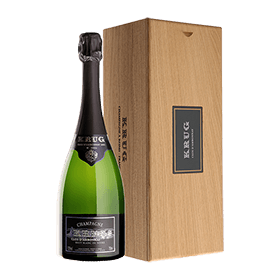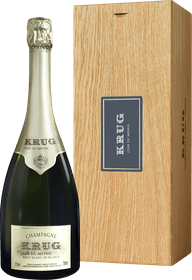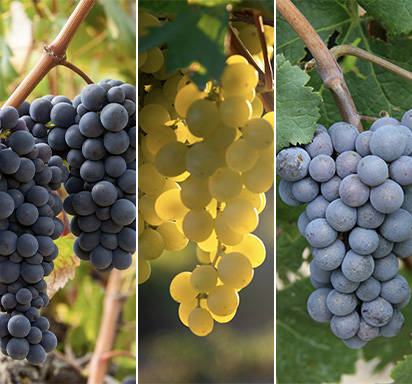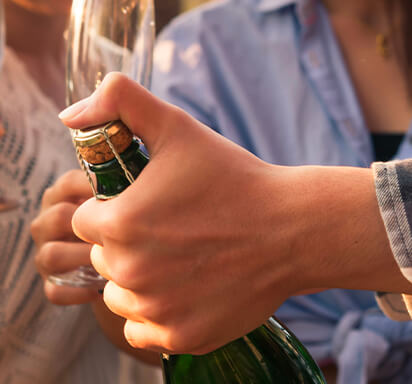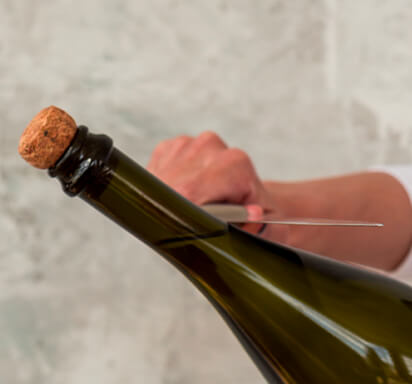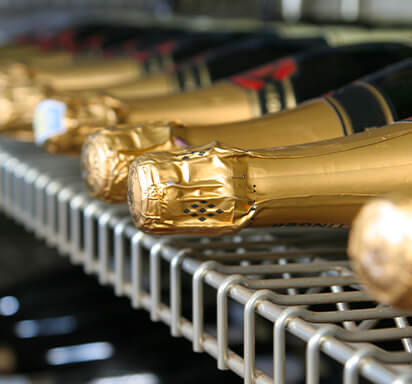How long does Champagne last? It depends...
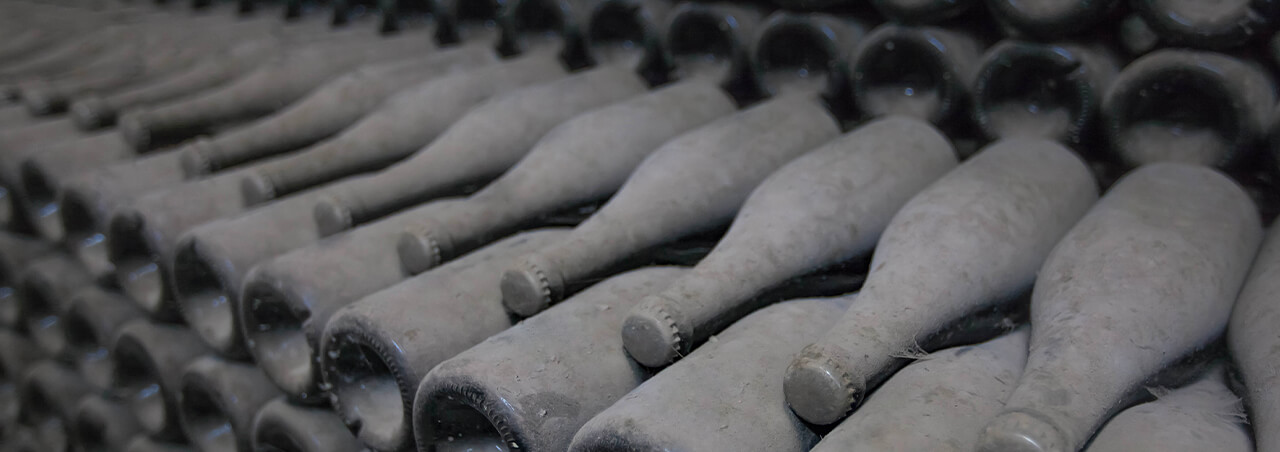
No matter why, it could be helpful to know how long a bottle of Champagne lasts. In this article, we take a look at the shelf-life of our favorite French bubbly and provide some tips on how to properly store it.
So, you have purchased a beautiful bottle of Champagne from a special vintage and would like to hold on to it for a special occasion? Or maybe you have opened a bottle but cannot finish all of it? In either case, it could be helpful to know how long a bottle of Champagne lasts. In this article, we take a look at the shelf-life of our favorite French bubbly and provide some tips on how to properly store it.
HOW LONG CAN YOU KEEP AN OPEN BOTTLE OF CHAMPAGNE OR SPARKLING WINE?
As with all sparkling wines (or carbonated drinks in general), an open bottle of Champagne will last a few hours before eventually losing the fizz of its carbon dioxide gas and becoming flat. As this is inevitable, it is best to drink the Champagne as soon as the bottle is opened. Or, use the leftover champagne in a recipe, to deglaze a pan of stir-fried vegetables or in a pasta sauce, for example.
Nevertheless, it is possible to hold on to the bubbles for a few days by sealing the bottle with an airtight cork, Champagne stopper or even plastic wrap. Of course, your favorite bubbly from France will never be as effervescent as the first time you open it, but sealing the bottle can at least keep it slightly fizzy for some time longer. How long does Champagne last unopened? If you seal the bottle and keep it upright in your fridge, it can last 3-5 days longer.
WHAT ABOUT AN UNOPENED BOTTLE OF VINTAGE CHAMPAGNE?
Vintage champagnes produced by world-renowned Champagne brands like Dom Perignon are aged for a minimum of three years on lees (dead yeast cells) before they see the light of day. In actuality, these Champagnes are typically aged for much longer than this minimum requirement, often for five years after vintage or even longer. This extended lees-aging gives the wines plenty of structure and complexity, allowing them to keep for even longer in the bottle once they are commercialized.
Lees-aged for over three years, vintage champagne will age fantastically, evolving complex tertiary aromas over time spent in your cellar. How long does champagne last unopened in your cellar? Vintage champagne can last five to ten years for a vintage of high quality, but can continue evolving for 15+ years.
WHAT IS THE SHELF LIFE OF A NON-VINTAGE CHAMPAGNE?
While vintage Champagne is made from grapes harvested in the same year, non-vintage Champagne blends base wines from several past vintages (reserve wines). These Champagnes are aged for a minimum of 15 months. The shelf life of Champagne in the non-vintage category is between three to four years.
Nevertheless, some of the most prestigious NV Champagnes, like the Krug Champagne Grande Cuvee, are aged for much longer than the minimum requirement and also enjoy a much more significant aging potential. These Champagnes can age for 15 years or longer. So, it all depends on the winemaking process of your individual champagne. If you have any doubts about its aging potential, do not hesitate to contact our team or check the brand’s website.
DOES CHAMPAGNE GO BAD?
You might be asking yourself, “But does Champagne expire?” Unfortunately, yes, and it’s not pleasant. Both open and unopened Champagne bottles can go bad, most often through oxidation of the wine. How do you spot bad Champagne? There are some clear warning signs to look out for:
• A darker color than normal
Color is a good first indicator of a bad Champagne. While a fresh white champagne tends to spot a pale golden color, a Champagne that has gone bad will be darker yellow or even brown in color. A rose Champagne can turn from pale pink to dark pink or tawny brown.
• No “pop” when the bottle is opened
The pop of the bottle and fizz that follows let you know that your Champagne bottle is still carbonated and full of life. If you do not hear these sounds when opening your bottle, this can indicate that your Champagne has gone bad.
• Moldy or shriveled cork
After opening your bottle, take a look at the cork. If it shows signs of infection by mold or if it is shriveled and dry, this can indicate that your bottle of Champagne has gone bad. Check the bottle. If there are clumps of mold or sediment floating around in your wine, you should probably toss it.
• Off-aromas and sour taste
And finally, it’s all in the smell and taste. Fresh Champagne will exude bright fruit aromas, floral fragrances and a touch of minerality, often with nuances of brioche and other baked goods or a touch of honey with age. If your Champagne smells sour or has off-aromas of mushroom juice, this can indicate that it has gone bad. A sour taste in the mouth is also sign of spoilage.
If you do come across a Champagne that has gone bad, the best thing to do is to get rid of it and take a new bottle. While a few sips will not harm you, it is advisable not to drink a large quantity of spoiled Champagne.
TIPS FOR KEEPING YOUR CHAMPAGNE LASTING LONGER
While no Champagne will keep forever, there are a few techniques to keep them fresh for a long period of time. For opened bottles of champagne, simply seal the bottle and keep it in a fridge in an upright position. How long to keep champagne once it is opened? Sealing the bottle and keeping it in a cool place will allow it to last another 3-5 days.
Store unopened Champagne bottles in a cool (45° and 65°F), humid (70-85%) and dark environment. Also, make sure to store champagne bottles on their sides, to keep the cork from drying out and shrinking. Champagne can last 15 years when stored properly. For more information on the proper storage conditions, discover our article about how to store champagne.
And when selecting champagne for long-term storage, make sure to choose the right format and style of champagne. We recommend selecting a big champagne bottle, especially the Magnum Champagne bottle (ideal for aging) of a vintage champagne from a reputable Champagne House. Cheers!
Would you like to know “Where can I find champagnes near me?” Discover our complete online Champagne selection or visit our NYC store to find them! And if you have any more questions about proper Champagne store, do not hesitate to reach out directly. Our team is ready to guide you through the process of purchasing and storing your favorite Champagne!
You may like
Unveil the unique characteristics of Champagne Blanc de Blancs and Blanc de Noirs. Learn how these two styles differ in flavor, grape varieties, and food pairings to elevate your Champagne experience.
12/19/2024Discover how Chardonnay, Pinot Noir, and Pinot Meunier shape the distinct character of Champagne. Learn about rare grape varieties and explore notable examples from top producers in the world’s most famous sparkling wine region.
7/4/2024To help you safely open a bottle of bubbly, we have put together a guide with 6 simple steps. Learn more about when to open a bottle of Champagne and how to do it in the safest and most graceful way.
3/11/2023A swift swoop of the knife along the neck of the bottle, followed by a “pop!” as the glass shatters and the “hiss” of the Champagne as it flows out. There is no more festive way of opening a bottle of Champagne than by sabering it
3/8/2023Guardian of the bottle and the precious bubbly inside, the cork serves an essential role in the preservation of Champagne. Over the years, it has evolved and adapted to this very special role.
3/6/2023What is the best way to store Champagne or sparkling wine for the short or long term? Find here best storage practices, which will help keep your bottle of bubbly Champagne or sparkling wines fresh for as long as possible.
2/20/2023
